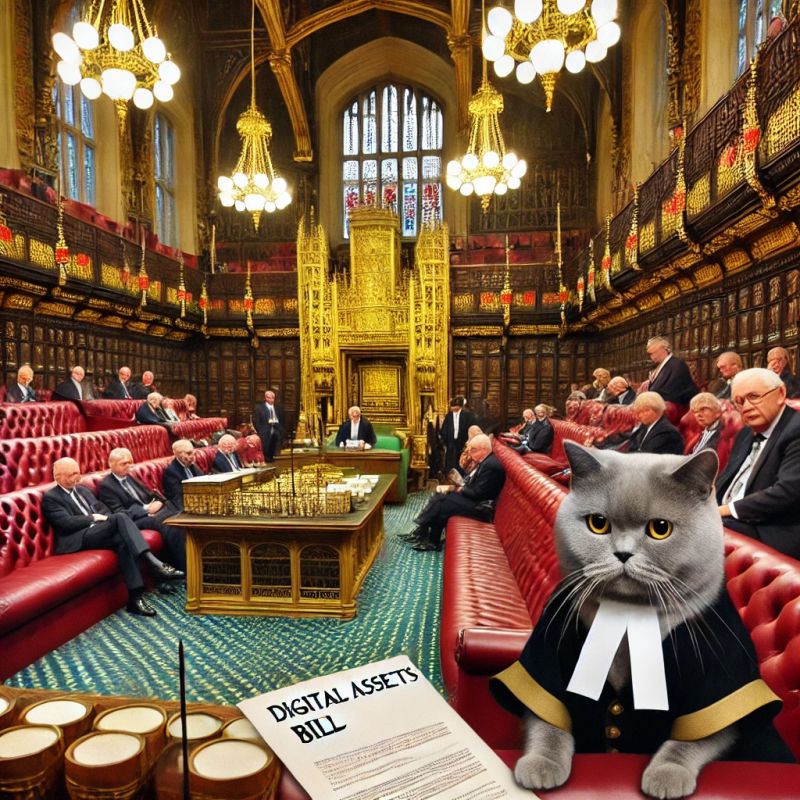
Latest in the D’Aloia Case
Learn more
September 12, 2023
Last Updated: October 23, 2023

Is the UK unfairly imposing Inheritance Tax (IHT) on crypto enthusiast’s estates on death despite private keys being lost?
An article in the Crypto Times suggests the following:
“Surprisingly, the UK government is imposing substantial taxes on the estates of deceased crypto traders, adding a financial burden to grieving families.
In the UK, the government doesn’t tax the first £325,000 (about $409,000) of their fund when someone passes away. But if their total belongings are worth more than that, the government takes whooping 40% of the extra amount.”
Of course, one of the results of crypto being found by the Courts to be personal property is that the value of those assets will fall within a person’s estate and potentially be subject to IHT.
Further, for the same reasons, cryptoassets may also be subject to a trust.
However, it goes on to say the following:
“The latest report in the community suggests that nearly $30.2 million in cryptocurrency becomes irrecoverable after their owner dies without sharing the details of the wallet’s private key.
The private key is a password to recover a crypto wallet.
Despite this, families of these dead crypto traders still have to pay potentially substantial tax bills.”
I really struggle to see how, in practice, estates are paying IHT on lost assets.
There are two reasons for this and I will come to them shortly.
That said, I fully support raising the issue of estate / succession planning for crypto assets. It’s an area where only limited progress is being made.
On the assumption we are talking about “your key, your crypto brigade” (rather than those using centralised ownership like Coinbase / Binance) there is a fine balance between estate planning and security.
We’ve seen a few high-profile examples where the owners of exchanges have died with the password stored only in their memories. A case of the ship going down with the captain!
So, it’s easy to see how a private client’s affairs might go the way of the pear.
Back to main plot.
Firstly, it is difficult to see how anyone would go through the process of mapping out their assets to their executors and / or beneficiaries but make no provision for them to secure the assets post death.
It would seem more likely that a person who didn’t make provision also, in all likelihood, didn’t set out what digital assets they owned to their nearest or dearest (or their lawyers).
But let’s say Mo has a portfolio of crypto tokens held via his Nano Ledger. They are valued at £1m. He has a small holding on Coinbase.
Let’s deal with the assets connected to his private ledger.
12 hours prior to his death, Mo had an epiphany and prepared an accurate spreadsheet of the assets including up to date valuations. He printed this out and left it on his desk.
Critically, he forgot to tell anyone where he stored his ledger and certainly hadn’t shared his seed phrase. He’d meant to check some of the new commercial solutions becoming available but, well, yer know.
So, all he left behind was a list of what he owned.
How would we approach this unlikely scenario?
As I have said many times before, HMRC’s guidance on cryptoassets is pretty thorough (even if I may not agree with a chunk of it!)
HMRC’s manuals have a significant chunk on loss of private keys for CGT purposes:
“CRYPTO22400 – Cryptoassets for individuals: Capital Gains Tax: losing private keys
If an individual misplaces their private key (for example throwing away the piece of paper it is printed on), they will not be able to access their tokens.
The private key still exists as part of the cryptography, albeit it is not known to the owner anymore.
Similarly the tokens will still exist in the distributed ledger. This means that misplacing the key does not count as a disposal for Capital Gains Tax purposes.”
But
“If it can be shown there is no prospect of recovering the private key or accessing the tokens, a negligible value claim could be made.
If HMRC accepts the negligible value claim, the individual will be treated as having disposed of and re-acquiring the tokens they cannot access so that they can crystallise a loss.”
Of course, this is for CGT. But it shows that HMRC understand the issue of a lost private key and how they are prepared to accept that the assets become worthless when they are irrecoverable.
This is necessary for CGT purposes because, if one wants to, say, use a loss, then you need to dispose of it – usually by sale or gift. However, if the private key is lost you cannot effect a disposal. So these provisions are necessary.
IHT on death is different.
Broadly speaking, forgetting reliefs and exemptions, one is taxed on the assets in which you were beneficially interested immediately prior to death.
Clearly, Mo had a beneficial interest in the assets immediately before death.
Further, it is this same date on which assets are valued. So, immediately prior to death, Mo could still control the assets, so the valuation is conducted on the basis he can still access the private key.
This sounds like a massive spanner in the works.
However, the IHT tax code has thought of this. By virtue of this section increases or decreases in the value of the property comprised in the deceased’s estate which have occurred by reason of the death shall be taken into account as if they had occurred before the death.
So, I think this provides us with the answer.
Because Mo’s death means the assets have become irrecoverable (assuming that is the case) then, because the loss in value is as a result of his death, we can pretend the fall in value took place immediately before death.
It should be noted that my view is that the above only applies to private keys controlled by the investor.
If, say, a person holds all of their coins on Coinbase or Binance, for example, they hold a right of action against the platform rather than a proprietary right in the actual crypto.
As such, this right will pass on to the estate who will be able to enforce it. Of course, the estate may be totally unaware of the account (although Mo has provided a nice list). But in those circumstances, it is difficult to see how it could ever be brought into account by the executors / personal representatives!
In Mo’s case, his representatives are aware of his Coinbase account so will need to show that he has died and take control of the assets – in much the same way as a bank account or share trading portfolio.
Although I don’t agree with the article’s content, I do agree with the sentiment that crypto enthusiasts should ensure they properly look at estate and succession planning.
This is particularly the case for those who don’t hold their assets via centralised exchanges.
However, this is not because I feel HMRC will start imposing tax on lost private keys, but more the fact that I would expect people would want to pass on their assets to their nearest and dearest.

Andy has a breadth of experience as a Barrister and as a Chartered Tax Advisor, which means he comes into the crypto space with expertise he can't wait to share.
Learn more"*" indicates required fields
Want to join the community? View our range of packages with exclusive perks!
It’s not complicated. The best way to avoid bagholding is by staying informed. The best way of staying informed is by listening to the expert.
Andy has a wealth of experience and knowledge designed to help you navigate the crypto tax world, whether you’re in a bull run, sitting on uncomfortably large profits, or planning for the next halving.
Exclusive access
Exclusive access to one of the brightest minds in Crypto
Expert advice
Expert advice on preserving wealth, estate planning, wills, and so much more
International network
Connections to an international network of professional tax advisors

October 12th, 2024

September 12th, 2024

August 20th, 2024

August 2nd, 2024

June 17th, 2024

April 24th, 2024

April 4th, 2024

March 20th, 2024

March 20th, 2024

March 20th, 2024
Got a question or query about our community? Reach out now and we will get back to you soon.
"*" indicates required fields





